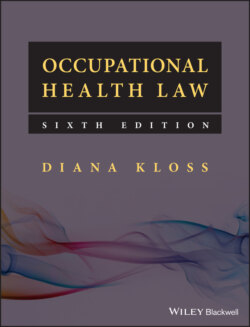Читать книгу Occupational Health Law - Diana Kloss - Страница 17
The geographical extent of the law
ОглавлениеThe United Kingdom consists of England, Wales, Scotland and Northern Ireland. England and Wales have the same law on the whole, but Scotland has a separate legal system and different procedures. As a general rule, Acts of the Westminster Parliament relating to health and safety, employment law and equal opportunities apply throughout Great Britain (which includes Scotland but excludes Northern Ireland). The Northern Ireland Assembly has had a chequered history in recent years, but since 1997 is competent to pass its own laws. Scotland and Wales now have devolved administrations and the Scottish Parliament has power to make law in a number of important fields, including health and education; the Welsh Assembly has power to pass legislation within a limited field of competence.
The Health and Safety at Work Act (Application outside Great Britain) Order 2013 extends the application of the Health and Safety at Work Act to offshore oil and gas installations, pipeline work, offshore construction, diving operations, etc. Safety statutes do not otherwise protect those who work abroad: they will have to rely on local regulations. A national of most Member States of the European Union must in general be allowed to work in any other Member State and will be entitled to the same social security benefits as the ‘locals’, though the nationals of the most recent entrants had their rights temporarily restricted. Medical and nursing qualifications obtained in any Member State must be recognised in all other Member States.
Employment laws, including health and safety laws, protect those who work in Great Britain. They may also extend to those who work abroad if they have a sufficiently close connection to GB. Unfair dismissal under section 94 Employment Rights Act 1996 was held to extend to a security adviser at an RAF base on Ascension Island, who was a British citizen, domiciled in England, working for a British company and receiving his wages in a bank account in England (Lawson v. Serco (2006)). The House of Lords held that he was in effect employed in a British enclave and should be protected by British law. British unfair dismissal law also applied to pilots employed by an airline based in Hong Kong, but who were themselves based in London (Crofts v. Cathay Pacific Airways Ltd (2005)). In Hottak v. Foreign and Commonwealth Office (2016), the claimant was an interpreter employed in the British Embassy in Kabul. He was a locally recruited Afghan citizen and his contract of employment was governed by Afghan law. He wished to claim for race discrimination in an English employment tribunal, claiming that he was protected by the Equality Act. The Court of Appeal held that he did not have a sufficiently close connection with GB for the Act to extend to him.
An action for damages for a breach of contract (including a contract of employment) may be brought in domestic courts against an employer with a place of business here, wherever the employee works. There are special, and highly complicated, rules about the jurisdiction of courts in the European Union, which are outside the scope of this book. The law which the court will apply will be that chosen by the parties in their agreement. Where they have not made a choice, it will be the law of the place where the employee habitually works. A choice of law other than that of England, Scotland or Northern Ireland cannot deprive an employee of his rights under the law of Great Britain if he habitually works in this country (Contracts (Applicable Law) Act 1990 and the EU Rome 1 Regulation).
An employer based in Britain who sends employees abroad on temporary postings will have to take reasonable care for their health and safety. In Palfrey v. ARC Offshore Ltd (2001) an oil engineer contracted malaria in West Africa and subsequently died. The High Court held that the employer was liable for not taking reasonable steps to inform and protect him from such hazards.
Where a worker injured abroad seeks compensation from his British employer, who is unwilling to defend the case here, the UK court might decide to refuse to entertain the case because the foreign court is more appropriate. In one case of an industrial accident which occurred in Scotland, the English court decided that the injured workman must sue in the Scottish court, because all the witnesses were in Scotland (MacShannon v. Rockware Glass (1978)). But in Connelly v. RTZ (1997), an English worker who had been injured whilst working in Namibia for a British company was permitted to sue in the English court because legal aid was available here.
Following the Connelly case, a number of workers who were resident in South Africa brought actions in the English courts for compensation for the damage caused to them by working in the asbestos mines in South Africa for a local subsidiary of a British parent company, Cape plc. More than 3000 claimants eventually became involved. The employer argued that England was not an appropriate forum, because the claimants were all South Africans, spoke little English, had suffered the damage (mainly mesothelioma and asbestosis) in South Africa, and because all the evidence was in South Africa. The claimants submitted that without legal aid (which was not available to them in South Africa) they could not practically continue with their suits. In England there was also the possibility of using conditional fee arrangements with the lawyers. The House of Lords held that, though South Africa was the natural forum, this was a case where that was outweighed by the interests of justice. At the time of writing, millions of pounds have been paid in settlements to the South African workers (Lubbe v. Cape plc (2000)).
